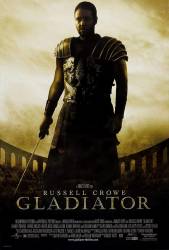Question: Why was Lisa Gerrard denied an Oscar nomination for Original Score?
Question: There is a scene where there is a play fight between 'Maximus' and 'Commodus', but how would the people be able to get away with making fun of their Emperor? Wouldn't guards or someone else like that punish them or tell the Emperor?
Answer: The art of parody dates back to those times - examples exist in both Greek and Roman literature. While it was potentially unwise to make fun of somebody quite as unstable as Commodus, they're not really risking much. It would hardly look good for an Emperor who's trying to win the hearts of his people if he executed a bunch of actors simply because they poked fun at him.
Question: In the Barbarian Horde battle, why on earth is there a gas cylinder in the chariot to begin with? What significance does it have for the "prop" (i.e. the chariot)?
Answer: It's full of compressed air, used to flip over the chariot.
Question: When Maximus was sold as a slave and was then attacked using a sword why didn't he fight back, and what did Proximo mean when he said that his time will come?
Answer: Maximus didn't want to be forced to fight. "His time will come" means he will either be forced to fight when put into the arena or he will die.
Question: In the first fight scene as gladiators they are chained up together as pairs. Maximus continues not saying anything...then the next battle scene Maximus walks across all of the gladiators and is greeted just like he was when he was a general to his soldiers, and he has a battle against 6 or 7 people. Why was he singled out to fight all by himself? The movie didn't portray him as standing out in the first gladiator battle when he was chained with the Nubian.
Answer: After the first battle he was quickly identified as being General Maximus Decimus Meridius, the great leader of the roman armies, by his fellow gladiators and Proximo. Although the outside world didn't know, Proximo put him up for more prestigious battles because he is a great warrior and leader.
Question: Why is it necessary for Commodus to order the deaths of Maximus and his wife and son? Why and how is Maximus a threat?
Answer: Emperor Marcus Aurelius told his son, Commodus, that Maximus would be his successor and the next Emperor instead of his son. This angered Commodus and he killed his father before the Emperor could name his successor. Commodus then ordered for Maximus to be executed, partly out of hatred and fear that Maximus may have already been told that Marcus was going to name him as his successor. Out of jealousy, hatred, and anger, Commodus also ordered Maximus' wife and son to be killed. In real life, Marcus granted Commodus the rank of Imperator and made him co-Emperor before his death and there was never a question who the successor would be, plus General Maximus is a completely made up character and never existed in real life. So this hatred of Maximus and fear of not being Emperor was made up just for the movie, so it's hard to say exactly what threat Maximus may have been if left alive.






Answer: Because she didn't actually compose any parts. I quote Hans Zimmer himself: "I gave Lisa Gerrard the co-credit because, even though she didn't write the main theme, her presence and contributions were very influential." Source: http://www.soundtrack.net/features/article/?id=210.
Mortug